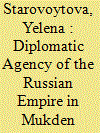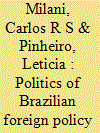| Srl | Item |
| 1 |
ID:
192508


|
|
|
|
|
| Summary/Abstract |
In the late 19th century, tsarist Russia stepped up its foreign policy activity considerably in the Far East, particularly in China. One of the main regions of China within the Russian Empire's sphere of interest was the so-called "Three Eastern Provinces" (Manchuria), where the Chinese Eastern Railway (CER) was laid and the Kwantung Oblast (Territory) of the Russian Empire was established. In 1900, Russian armed forces led by Admiral Ye.I. Alexeyev were forced to temporarily occupy all of Manchuria in order to suppress an uprising organized by followers of the anti-foreign Yihetuan movement, also known as the Boxer Rebellion. The occupied area included the city of Mukden, the capital at the time of Fengtian Province, one of the Three Eastern Provinces. The importance of Mukden as an administrative and business center and one of the largest railway stations on the CER made it necessary to have an official representative of the tsarist authorities in the city. As the Boxer Rebellion was suppressed, a growing number of diverse firms and commercial enterprises began to appear in the re-gion, and in this connection, foreign powers sought to expand their presence there.
|
|
|
|
|
|
|
|
|
|
|
|
|
|
|
|
| 2 |
ID:
153543


|
|
|
|
|
| Summary/Abstract |
Starting from the perspective that foreign policy is a public policy, this article discusses the conceptual and political implications of the new configuration of Brazilian foreign policy. Therefore, we abandon its automatic association with the cruder versions of realism and bring it to the field of politics, thus recognizing that its formulation and implementation fall into the dynamics of governmental choices which, in turn, stem from negotiations within coalitions, bargaining, disputes, and agreements between representatives of diverse interests. As a result, we remove foreign policy from a condition linked to inertial and supposedly self-evident and/or permanent national interests (which would be protected from injunctions of cyclical nature related to partisan politics) and undress it of features generally attributed to so-called state policies. Finally, we suggest ways for an innovative research agenda on the role of diplomatic agency, political institutions, and nonstate actors in Brazil’s foreign policy.
|
|
|
|
|
|
|
|
|
|
|
|
|
|
|
|